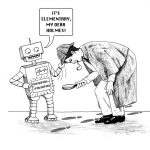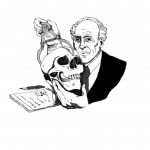A couple nights ago I was browsing one of the Russian chess sites, www.64.ru, and came across an interesting article by Anatoly Karpov about the world championship match that never happened: Karpov vs. Fischer. The link is here if you want to test your Russian, but if not I’ll translate for you.
What’s interesting, first, is that Karpov says almost nothing about the 1975 match that was never arranged. From what I have read in Chess Life, those negotiations fell apart over Fischer’s insistence on a match to 10 wins, with a 9-9 tie going to the champion (so that Karpov would actually have to beat him 10-8 to win the championship). Karpov merely says, “It is possible that if we had met face to face earlier, then we might have played the official match of 1975. At that time our intermediaries and representatives did many things to keep that from taking place. Each of the official sides considered it a matter of honor not to agree, and to take a hard-line position. Both Fischer and I understood too late that we should have met without intermediaries.”
However, Fischer and Karpov did not meet in person until 1976, when they met three times: first in Tokyo, then in Madrid, and finally at the Phillippine embassy in Washington. Karpov claims — and of course, we have only his word for it — that he and Fischer very nearly agreed on the conditions for a match. Karpov says that he realized Fischer would not back down from his insistence on a match to 10 wins, and so he agreed to this, provided that there was a suitable break at the halfway point. What about the 9-9 match clause? Karpov claims: “The rule about retaining the title in case of a 9-9 score fell away of its own accord. Fischer considered himself the champion of the world among professionals, the absolute champion. I, from his point of view, was the official champion.” If I’m interpreting Karpov’s words correctly, Fischer was willing in case of a 9-9 score to let Karpov be known as the “official” or FIDE champion, while he would be the “professional” or absolute champion. A rather interesting precedent of the split that actually occurred, more than a decade later, when Kasparov bolted from FIDE!
So why didn’t the match occur, then? Karpov says that it was because of one technicality.
At first we met in the city [Washington], and then went to the Phillippine embassy, because Campomanes [the president of FIDE at that time, a Phillippine citizen] had agreed with the ambassador that if we came to an agreement, we could come by and ask for his secretary’s help in formulating the documents… We had agreed about practically everything, we arrived at the embassy, and the text of the agreement was typed. Only one question remained unresolved — the name of the match. I presumed that we would eventually work out the name together, but at that moment we didn’t have a consensus. Fischer insisted that the match should have the name “The Absolute World Championship for Professionals.” At that time the idea of sports professionals was not well accepted either in the Olympic movement or in the USSR. I understood that with a name like that I would never be allowed to play the match. I would not have been able to convince the government of the country that we should forget about the name and set as our main goal the organization of the most interesting sporting event, at least in the history of chess.
It’s very interesting to read this passage, knowing about the hypocrisy that existed at the at time over the “professional” designation, where virtually all Soviet athletes were considered “amateurs” even though the state supported them financially. Fischer wasn’t stupid. He had to know that this would be a way of thumbing his nose at the Russians. But also, it’s a very consistent culmination of his lifelong battle to have chess players recognized as professionals. You can also see why he didn’t mind leaving Karpov with the title of FIDE champion in case of a tie: the only title he cared about was being the absolute champion. I think there was a very interesting mind game going on here! According to Karpov, he and Fischer never met again after their near-agreement in Washington.
It’s a little bit difficult to know how seriously to take this tale of Karpov’s. There were certainly rumors of a hush-hush meeting between Karpov and Fischer in 1976, but I have never before read a detailed account of it. The thing about the story that’s a bit suspicious is that Karpov comes out looking awfully good. He and Fischer agreed except for one little sticking point, but — darn it! — that mean old Soviet government kept them from playing the match. Aw, shucks. Better luck next time.
Here is what one reader of “64” magazine has to say about Karpov’s article and his supposed willingness to play a match against Fischer:
One doesn’t wave one’s fists around after the fight is over! This isn’t the first time we have seen something like this from you, Anatoly Evgenievich [Karpov]. I’ve heard more than once about how you “wanted” to play Fischer and Kasparov. Unfortunately, I’ve only heard it from your mouth.
If only those typed documents from the Phillippine embassy would turn up, then Karpov’s story might have a little bit more veracity. Until then, I would take it with a grain of salt.



